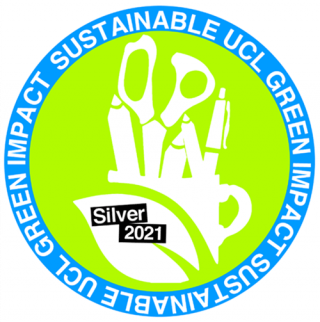UCL Heating, Cooling and Ventilation
Keeping UCL buildings warm in the winter and cool in the summer is responsible for more than half of UCL’s total carbon footprint, leading to over 40,000 tonnes of CO2 every year. The average amount of CO2 tonnes the Department of Chemical Engineering produced in 2019 was:
- Electricity – 588 tonnes
- Fuel & Heat – 83 tonnes
To help combat this and in conjunction with UCL’s Heating, Cooling and Ventilation Policy, the Department is working towards a ‘Bronze’ Green Impact award in 20/21, with an aim of being ‘Gold’ by 22/23. This is also to help improve our environmental impact in our offices including how we manage energy usage.
For more information visit the UCL Heating, Cooling and Ventilation Policy website.
Renewable Energy
What is renewable energy?
Renewable energy is energy that is collected from renewable resources, which are naturally replenished on a human timescale, such as sunlight, wind, rain, tides, waves, and geothermal heat. Renewable energy often provides energy in four important areas: electricity generation, air and water heating/cooling, transportation, and rural (off-grid) energy services.
- Reference: Wikipedia
Why is using renewable energy important?
- Renewable energy technologies are clean and have a much lower environmental impact, through reduction of greenhouse gas emissions, than traditional energy technologies.
- It does not run out unlike other sources of energy which deplete over time.
At UCL
As of the 1st August 2019 UCL’s electricity supply is from renewable electricity generated by solar, wind or hydro in the UK. The CO2 emissions in the figures above are possibly overestimated as they are calculated using an industry standard conversion factor which does not assume 100% renewable energy.
For more information visit the UCL 100% renewable energy website.
At Home
Energy providers promise to supply energy that’s up to 100% renewable by offering ‘green energy tariffs.
If you’re curious as to how much of your energy supply is green, you can look at your supplier’s fuel mix on your bill which shows a breakdown of how much of your energy supply comes from renewable sources.
However, it’s worth noting that even electricity generated from renewable sources has some impact on the environment so to be more transparent, some companies also give details of the overall carbon content of their electricity.
More and more providers are beginning to offer some form of green energy tariff so be sure to shop around.
Tax Relief on Energy
If UCL requires you to work at home, you can claim for tax relief on a flat rate of £4 per week for the tax year 2019/2020 and £6 per week for the tax year 2020/2021. This applies whether you work full or part-time for the University. It is important to keep a full record of any expenditure relevant to working from home (e.g. copies of utility bills) if you want to submit a claim for above the flat rate entitlement.
For more information on how to claim for tax relief on your energy bills, visit the UCL pay and benefits website.
 Close
Close




